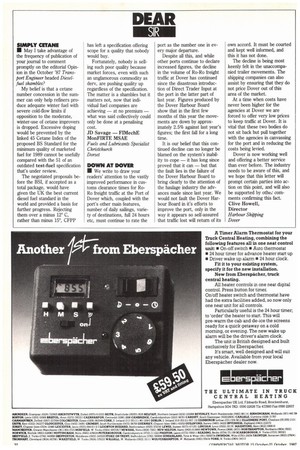SIMPLY CETANE • May I take advantage of the frequency
Page 34

If you've noticed an error in this article please click here to report it so we can fix it.
of publication of your journal to comment promptly on the editorial Opinion in the October '87 Transport Engineer headed Dieselfuel shambles?
My belief is that a cetane number concession in the summer can only help refiners produce adequate winter fuel with severe cold-flow limits if opposition to the moderate, winter-use of cetane improvers is dropped. Excessive doping would be prevented by the linked 45 Cetane Index of the proposed BS Standard for the minimum quality of marketed fuel for 1989 cannot be usefully compared with the 51 of an outdated test-fuel specification that's under review.
The negotiated proposals before the BSI, if accepted as a total package, would have given the UK the best current diesel fuel standard in the world and provided a basis for further progress. Rejecting them over a minus 12° C, rather than minus 15°, CFPP has left a specification offering scope for a quality that nobody would buy.
Fortunately, nobody is selling such poor quality because market forces, even with such an unglamorous commodity as derv, are pushing quality up regardless of the specification. The matter is a shambles but it matters not, now that individual fuel companies are achieving — at no premium — what was said collectively could only be done at a penalising cost.
JD Savage — FIMechE MonFIRTE MSAE
Fuels and Lubricants Specialist Christchurch Dorset
DOWN AT DOVER
10 We write to draw your readers' attention to the vastly improved performance in customs clearance times for RoRo freight traffic at the Port of Dover which, coupled with the port's other main features, number of daily sailings, variety of destinations, full 24 hours etc, must continue to rate the port as the number one in every major departure.
Despite all this, and while other ports continue to declare increased figures, the decline in the volume of Ro-Ro freight traffic at Dover has continued since the disastrous introduction of Direct Trader Input at the port in the latter part of last year. Figures produced by the Dover Harbour Board show that in the first few months of this year the movements are down by approximately 2.5% against last year's figures; the first fall for a long time.
It is our belief that this confirmed decline can no longer be blamed on the system's inability to cope — it has long since proved that it can — but that the fault lies in the failure of the Dover Harbour Board to bring clearly to the attention of the haulage industry the advances made since last year. We would not fault the Dover Harbour Board in it's efforts to improve the port, only in the way it appears so self-assured that traffic lost will return of its own accord. It must be courted and kept well informed, and this it has not done.
The decline is being most keenly felt in the unaccompanied trailer movements. The shipping companies can also assist by ensuring that they do not price Dover out of this area of the market.
At a time when costs have never been higher for the agencies at Dover we are forced to offer very low prices to keep traffic at Dover. It is vital that these two bodies do not sit back but pull together with the agencies in canvassing for the port and in reducing the costs being levied.
Dover is now working well and offering a better service than ever before. The industry needs to be aware of this, and we hope that this letter will prompt certain parties into action on this point, and will also be supported by othe: comments confirming this fact. Clive Howell, Director Harbour Shipping Dover




































































































